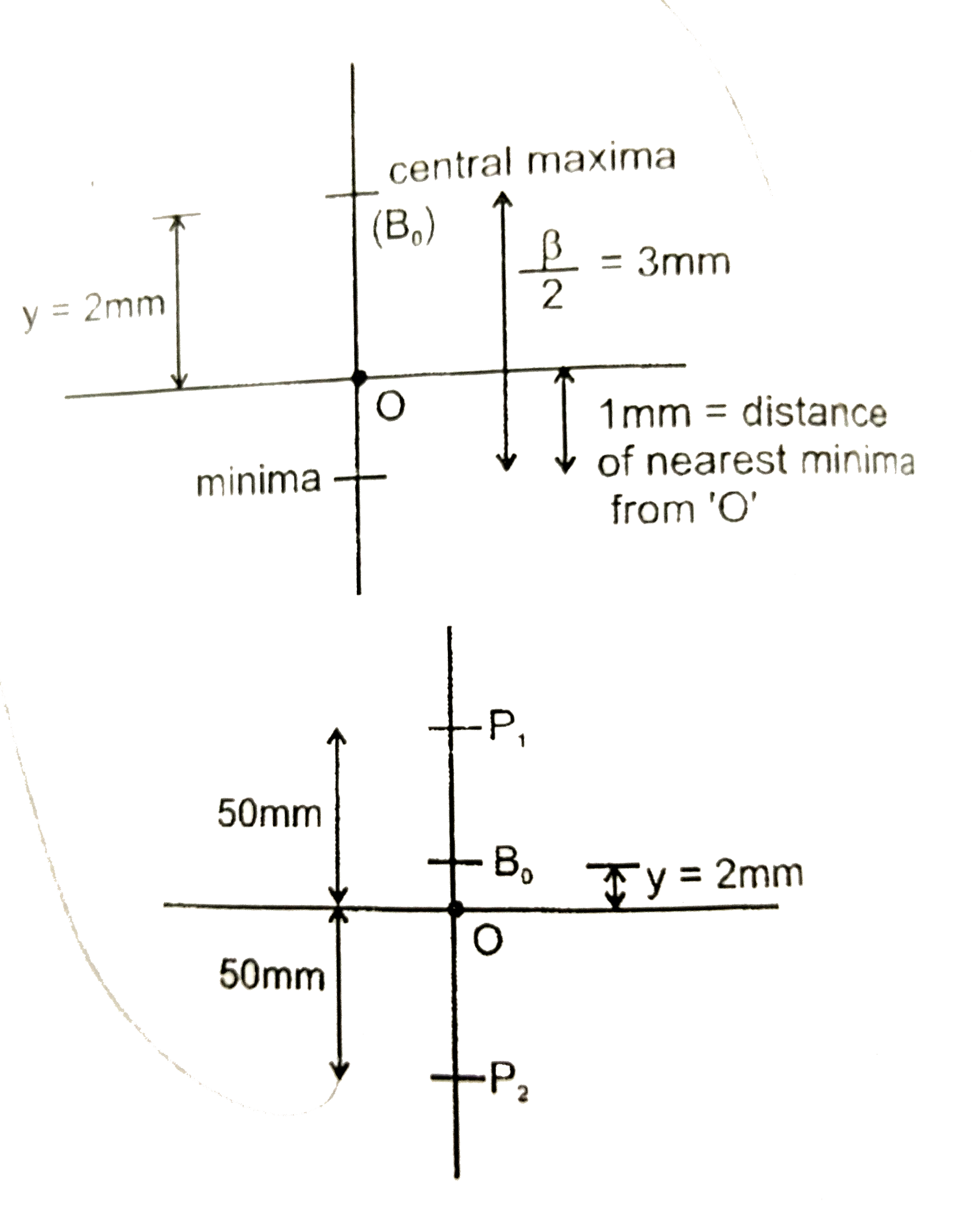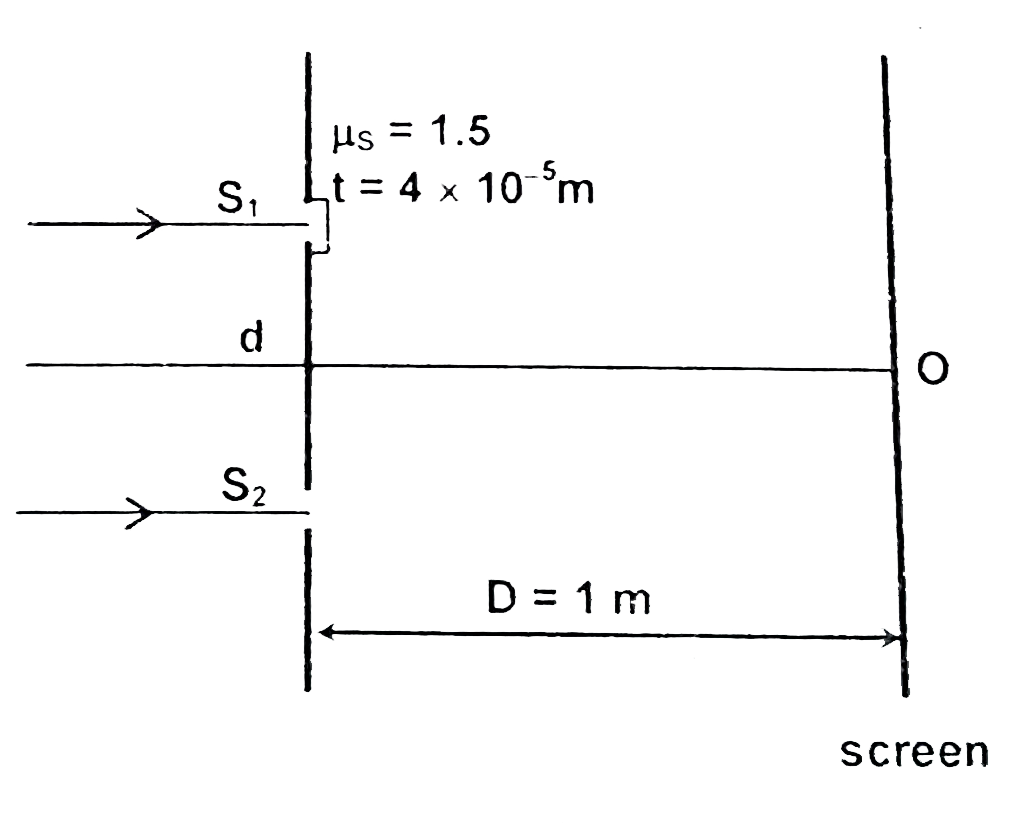_E01_102_Q01.png)
In a YDSE a parallel beam of light of wavelength 6000Å is incident on slits at angle of incidence 30∘. A and B are two thin transparent films each of refractive index 1.5. thickness of A is 20.4μm. Light coming through A and B have intensities I and 4I resepctively on the screen. Intensity at point O which is symmetric relative to the slits is 3I. The central maxima is above O.
(i). what is the maximum thickness of B to do so.
Assuming thickness of B to be that found in part (i)
Answer the following parts.
(ii). Find fringe width, maximum intensity and minimum intensity on screen.
(iii). Distance of nearest minima from O
(iv) intensity at 5 cm on either side of O.
The correct Answer is:(a) tB=120μm
(b) β=6mm;Imax=9I,Imax=I
(c) β/6=1mm (d) I(at5 cmaboveO)=9 I<br>I("at" 5 cm "below" O)=3I
(a) For maxima thickness of B. the central maxima is just above O.
⇒ Phase difference at O must be =2π3{∴cosϕ=−12for3Iintensity}.
⇒ Path difference at O=2π3×λ2π=λ3
⇒dsin30∘+(μA−1)×tA−(μB−1)tB=λ/3
get tB=120μm.
(b) Now tB=120μm.
bete=λDd=6000×10−10×10.1×10−3=6mm .
Imax=(√4I+√I)2=9I
Imin=(√4I−√I)2=I
(c) ΔP path difference at 'O'
⇒ΔP=dsinθ+(μA−1)tA−(μB−1)tB
=0.1sin30∘+(1.5−1)×20.4−(1.5−1)×120
ΔP=2×10−7m
∴ydD=ΔP
∴y=DdΔP=10.1×10−3×2×10−7=y=2mm
∴β=λDd=6mm
distance between maxima and minima =β2=3mm
distance of nearest minima from 'O'=β6=1mm

(d) So phase difference at P1
Δϕ=ydD×2πλ
=48×10−3×10−41×2π6000×10−10
Δϕ=16π
Intensity at 'P'1
I1=4I+I+2√4I2cos(16π)
I1=9I
Intensity at point 'P'2
phase differnce at 'P'2
ΔP=2πλ×ΔP
ΔP=ydD=52mm×0.1mm1m
Δϕ=2π6000×10−10×52mm×0.1mm1m
Δϕ=52π3=16π+4π/3
I2=4I+I+2√4I2cos(16π+4π/3)
I2=4I+I+2√4I2cos(4π/3)
=4I+I−2×2I×12
I2=3I
Topper's Solved these Questions
Similar Questions
Light of wavelength 5000Å is incident over a slit of width 1μm. The angular width of central maxima will be
View SolutionA coherent parallel beam of light of wavelength 5000A is incident normally on the plane of slits. The slit S1 is covered with a slab of refractive index μs=1.5 and thickness t=4×10−5m as shown. The separation between the slits is d=1mm and the separtion between the plane of slits and screen is D=1m. Then the position of the central maxima formed on the screen is

View Solution
Knowledge Check
A parallel beam of light of wavelength 6000Å gets diffracted by a single slit of width 0.3 mm. The angular position of the first minima of diffracted light is :
A2×10−3radB3×10−3radC1.8×10−3radD6×10−3radA parallel beam of sodium light of wavelength 6000Å is incident on a thin glass plate of μ=1.5, such that the angle of refraction in the plate is 60∘. The smallest thickness of the plate which will make it appear dark by reflected light is
A3926 Ã…B4353 Ã…C1396 Ã…D1921 Ã…
Light of wavelength 6328Å is incident normally on a slit of width 0.2 mm. Angular width of the central maximum on the screen will be :
View SolutionTwo coherent light beams of intensities I and 4I produce interference pattern. The intensity at a point where the phase difference is zero, will b:
View SolutionA parallel beam of light of wavelength 560 nm falls on a thin film of oil (refractive index = 1.4). What should be the minimum thickness of the film so that it strongly transmit the light ?
View SolutionMonochromatic light of wavelength 580 nm is incident on a slit of width 0.30 mm. The screen is 2m from the slit . The width of the central maximum is
View SolutionLight of wavelength 6000A is incident on a thin glass plate of refractive index 0.5 such that angle of refraction into plate is 60° .calculate the thickness of plate which will make it appear dark by reflection?
View SolutionIn Young's double slit experiment with light of wavelength λ=600nm, intensity of central fringe is I0. Now one of the slit is covered by glass plate of refractive index 1.4 and thickness t=5μm. The new intensity at the same point on screen will be :
View Solution
